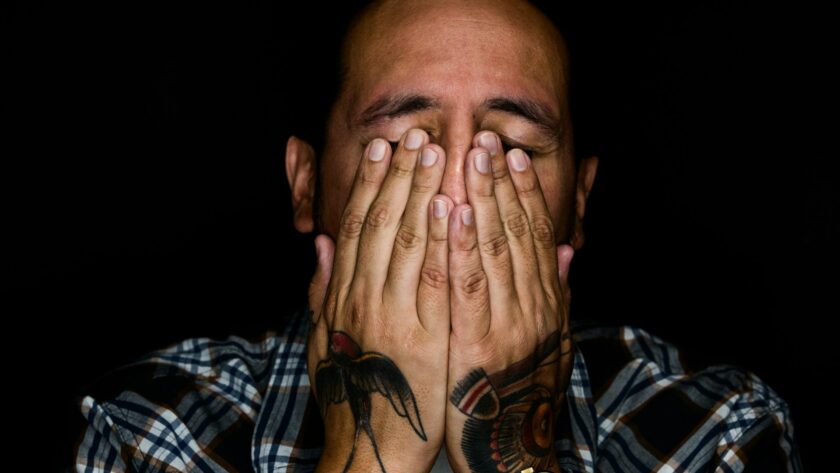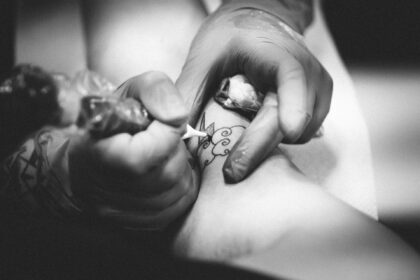Many people wonder, “Is it normal to feel sick after a tattoo?” The answer is yes, and it’s a phenomenon known as tattoo flu. This isn’t just about the pain of getting inked—it’s a physical reaction your body might have due to the trauma and stress caused by tattooing. Symptoms like shivering after a tattoo, feeling lightheaded after a tattoo, or even experiencing nausea are more common than you might think. Understanding what causes this reaction can help you prepare and ease concerns. Tattoo flu is temporary, but proper aftercare is key.
What Happens to Your Body During a Tattoo
When you get a tattoo, your body experiences trauma. The repeated puncturing of the skin by needles triggers an immune system response. Your body treats the ink and the act of tattooing as a wound. This is why some people may experience symptoms such as shock after a tattoo. The immune system sends white blood cells to the tattooed area to fight off potential infections, which can lead to feelings of fatigue and discomfort. This response may explain why you feel tired after a tattoo, a sensation that can last for a few days as your body works to heal.
But what exactly happens to your body during the different stages of tattooing and afterward?
- Tattoo Needles and Skin Penetration
When the tattoo needle pierces the skin, it penetrates the epidermis and dermis layers. This repeated puncturing causes physical trauma, triggering the body’s natural defense mechanism. - Immune System Response
As the body identifies the tattoo ink as a foreign substance, it sends white blood cells to the area. These cells attempt to break down and remove the ink, causing inflammation and swelling. This response may result in tattoo fatigue and feeling sick after getting a tattoo. - Adrenaline and Cortisol Release
During the tattoo session, your body releases adrenaline, which temporarily masks the pain and helps you endure the process. However, post-tattoo, the adrenaline levels drop sharply, leading to adrenal fatigue after a tattoo. This can result in feeling lightheaded, tired after a tattoo, or even experiencing shivering after a tattoo. - Healing Process and Shock Symptoms
After the tattoo session, your body focuses on healing the affected area. The immune system works to repair the skin, which may cause shock after a tattoo, especially if the session was long or painful. Some people may experience symptoms like nausea, fever chills after a tattoo, or even vomiting. These reactions are part of the healing process and are typically temporary.
Each stage impacts how you feel physically, so understanding these responses can help you manage and reduce discomfort after getting tattooed.
Common Symptoms of Tattoo Flu
Feeling sick after getting a tattoo can manifest in various ways. Common symptoms include fever chills after a tattoo, nausea, tattoo fatigue, and even dizziness. Some people may also experience diarrhea after a tattoo, or vomiting as their body copes with the stress. While these symptoms can be uncomfortable, they are generally short-lived and mild. However, recognizing these signs early can help you manage them better. If your symptoms worsen, it’s important to consult with a medical professional to rule out infection or other complications.
Here’s a list of common symptoms:
- Fever or chills
- Nausea or vomiting
- Shivering after a tattoo
- Feeling lightheaded or dizzy
- Tattoo fatigue (extreme tiredness)
- Muscle aches
- Diarrhea after a tattoo
- Headaches
These symptoms typically last for a short period and can be managed with rest, hydration, and proper aftercare.

image source – https://giphy.com/gifs/sick-sigh-12Eo3WBLbH9HRS
Causes of Tattoo Flu
There are several reasons why you might feel unwell after getting inked. One primary cause is adrenal fatigue after a tattoo. During the session, your adrenaline spikes due to the pain and anxiety. Afterward, this adrenaline high can crash, leading to exhaustion and other flu-like symptoms. Dehydration or not eating before a session can also exacerbate these symptoms, making you feel faint or nauseous. Additionally, getting a tattoo while your immune system is already compromised, such as getting tattooed while sick, can make the symptoms worse and prolong the recovery period.
| Cause | Description |
|---|---|
| Immune Response | The body reacts to tattoo ink as a foreign substance, triggering flu-like symptoms. |
| Adrenaline Crash | After the adrenaline rush from pain, levels drop, leading to fatigue and weakness. |
| Tattoo Trauma | Skin trauma from needle punctures can cause shock-like symptoms, including nausea. |
| Dehydration or Hunger | Lack of hydration or food before tattooing can result in dizziness and nausea. |
| Pre-existing Health Conditions | People with weakened immune systems may experience more severe symptoms post-tattoo. |
| Infection Risk | Infections can develop if aftercare is neglected, leading to extended flu symptoms. |
How to Prevent Tattoo Flu
Preventing tattoo flu starts with proper preparation and aftercare. Before your tattoo appointment, make sure you’re well-rested and hydrated. Drink plenty of water the day before and on the day of your session. Avoid alcohol and caffeine, as they can dehydrate you and increase the risk of feeling lightheaded after a tattoo. Eating a balanced meal is crucial, as an empty stomach can lead to nausea or dizziness during the tattoo process.
On the day of your tattoo, wear comfortable clothing and bring snacks, especially if it’s a long session. Keeping your body fueled with the right nutrients helps maintain energy levels and prevents tattoo fatigue or shivering after a tattoo.
After the session, follow the aftercare instructions provided by your tattoo artist closely. This includes keeping the tattoo clean, applying the recommended ointment, and avoiding direct sun exposure and use lotion or excessive sweating. Dehydration and neglecting aftercare can slow healing and increase the risk of infection, which can worsen tattoo flu symptoms like fever, chills, or vomiting after a tattoo.
Additionally, managing your pain with over-the-counter medications, such as ibuprofen, can help reduce inflammation and discomfort. Resting after your tattoo session is key to allowing your body to heal. Avoid strenuous activities for the first few days and keep your tattoo covered if needed.
By taking these preventive steps, you can reduce the risk of tattoo flu and ensure a smoother recovery process, minimizing symptoms like feeling sick after getting a tattoo.
When to Seek Medical Help
While tattoo flu is usually mild and short-term, there are times when medical attention is necessary. If your symptoms persist for more than a few days, or if you experience severe signs such as vomiting after a tattoo or extreme fatigue, it’s important to consult with a healthcare professional. In some cases, these symptoms could indicate an infection rather than just tattoo shock symptoms. Prolonged fever, excessive redness, swelling, or pus are clear indicators that something may be wrong. Don’t hesitate to seek advice if you’re unsure about the severity of your symptoms.
Conclusion
In conclusion, feeling sick after a tattoo is not uncommon and is often referred to as tattoo flu. It’s a natural response your body has to the trauma of tattooing. The symptoms, while uncomfortable, are usually temporary and can be managed with proper care and attention. Understanding why you feel this way and how to prevent it can help you have a smoother tattoo experience. Remember, listening to your body and seeking help when necessary is key to a quick recovery.





